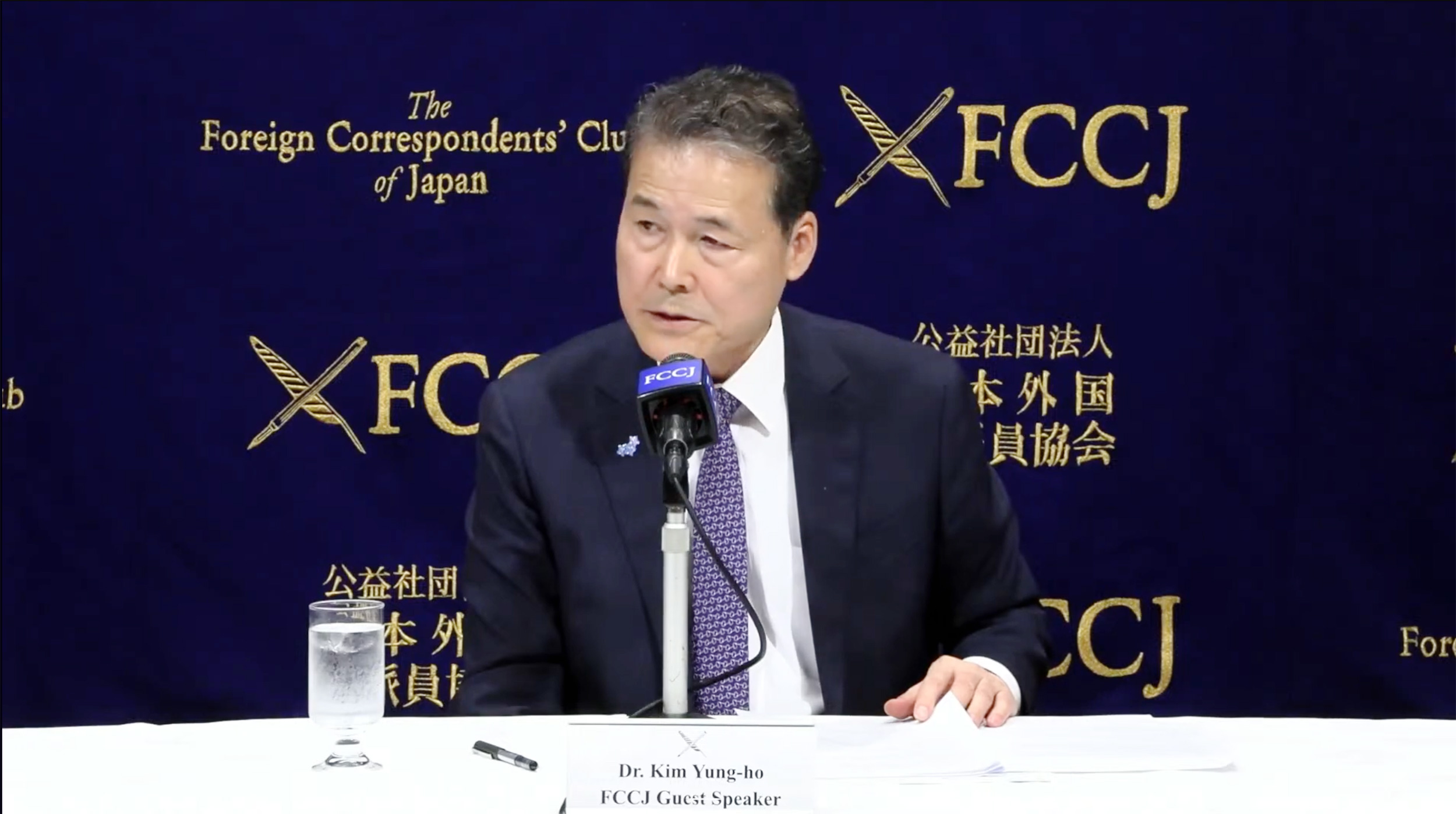Issue:
May 2025
Japan has a role to play in lowering tensions on the Korean peninsula, the South Korean unification minister tells the FCCJ

South Korea has experienced an extraordinary five months. Its conservative president, Yoon Suk Yeol, declared martial law - citing the need to confront “pro-North” domestic forces - before being impeached and arrested. Then he was ousted from office after a unanimous ruling by the Constitutional Court went against him.
Yoon will be the fifth former South Korean president to face a criminal trial, but he is the first to be indicted and arrested while still in office.
He will not be alone in making court appearances. In late April, the former liberal president, Moon Jae-in, was indicted for bribery, related to his son-in-law’s employment at an airline. Moon was a primary architect of attempts to forge closer ties with North Korea, and his defenders say the case is a politically motivated smear timed to coincide with the presidential election on June 3.
Min Seong-jae, a professor of communication and media studies at Pace University in New York, said South Korean society would continue to be intensely polarized in the runup to the vote. “Lee Jae-myung, the presumptive candidate, will likely become the president, barring a major upset,” he said. “Most polls predict a dominant win by Lee, but (he) is a polarizing figure and detested by many conservatives. Yoon still has vocal followers who regard him as a martyr.”
Min added: “There will still be some unrest and struggles even after the election is over.”
Amid the political intrigue, South Korean Unification Minister Kim Yung-ho visited the Foreign Correspondents’ Club of Japan last month to update us on the latest from the fractious peninsula. The ministry is tasked with reuniting the North and South after more than 70 years of division. That job has become more difficult now that Seoul itself is so deeply divided.
His FCCJ appearance aside, Kim discussed policies on Japanese and Korean abductions and human rights abuses by the North with government officials, including the foreign minister and chief cabinet secretary, as well as Diet members.
He said Japan had a role to play in stabilizing the peninsula. “Close cooperation between (South Korea) and Japan has become very, very important, so I came here to discuss the way in which Japan and my government will cooperate to cope with North Korean nuclear issues and human rights,” he said at the FCCJ.
“We welcome Japan’s active role in denuclearizing North Korea, improving human rights there, and resolving abductee issues.”
Kim did not offer any sense of warming ties between the two Koreas, noting Pyongyang’s deployment of troops in support of the Russian invasion of Ukraine.
“The regime uses forced labor and exploitation to support its military goals,” he said. “The deployment of troops to Ukraine shows how (North Korea) threatens global peace while prioritizing its survival over its people’s well-being."
In early April, South Korea’s military fired warning shots after 10 North Korean soldiers crossed the Demilitarized Zone, one of the most fortified borders in the world.
Other hot-button issues include Pyongyang’s frequent missile tests.
Nonetheless, Kim said the South had the financial capacity to support reunification should the neighbours move in that direction. “This utilitarian economic approach to Korean unification is very important,” Kim said, comparing Seoul’s moral responsibility toward the North and its people to U.S. President Abraham Lincoln's role in ending the slave trade.
“We are living in a free society, so how can we use this to further the freedom of people living in a dictatorial society?” he asked.
However, public doubt and ambivalence are obstacles to reunification. In a global survey of 9,000 people published in December, the Unification Ministry found a considerable number of respondents questioning whether the Koreas were on the road to unification. Some 46% polled in eight nations said they were skeptical about Korean unification, while 40% remained optimistic.
An earlier survey of South Koreans alone found that 35% saw unification as either entirely unnecessary or not particularly necessary - both record-high levels.
Most survey respondents cited denuclearization as an essential next step, followed by reducing the number of military confrontations between the nations.
While tasked with paving the road to peace, Kim said there was little to suggest Pyongyang would do the right thing. “We should not rely just on the goodwill of the (North) regime, but expand our focus to the North Korean people,” he said. “It is our moral duty to help.”
Min said a victory in June by Lee’s party may improve bilateral ties, but not to the point of unification. “Because Mr. Lee and his party has a more conciliatory approach toward North Korea, the relationship between the two Koreas will likely improve if Lee is elected,” he said. “I don’t think it means progress towards unification of the Korean peninsula. In general, the trend suggests we are moving away from the idea of one Korea.”
Kim, a former Keio University professor, said Japan should do more to help de-escalate tensions on the peninsula. “We welcome Japan’s contributions to peaceful Korean unification,” he said, adding that strong bilateral ties with Tokyo must be maintained, irrespective of who becomes South Korea's next president.
Dan Sloan is president of the FCCJ.

